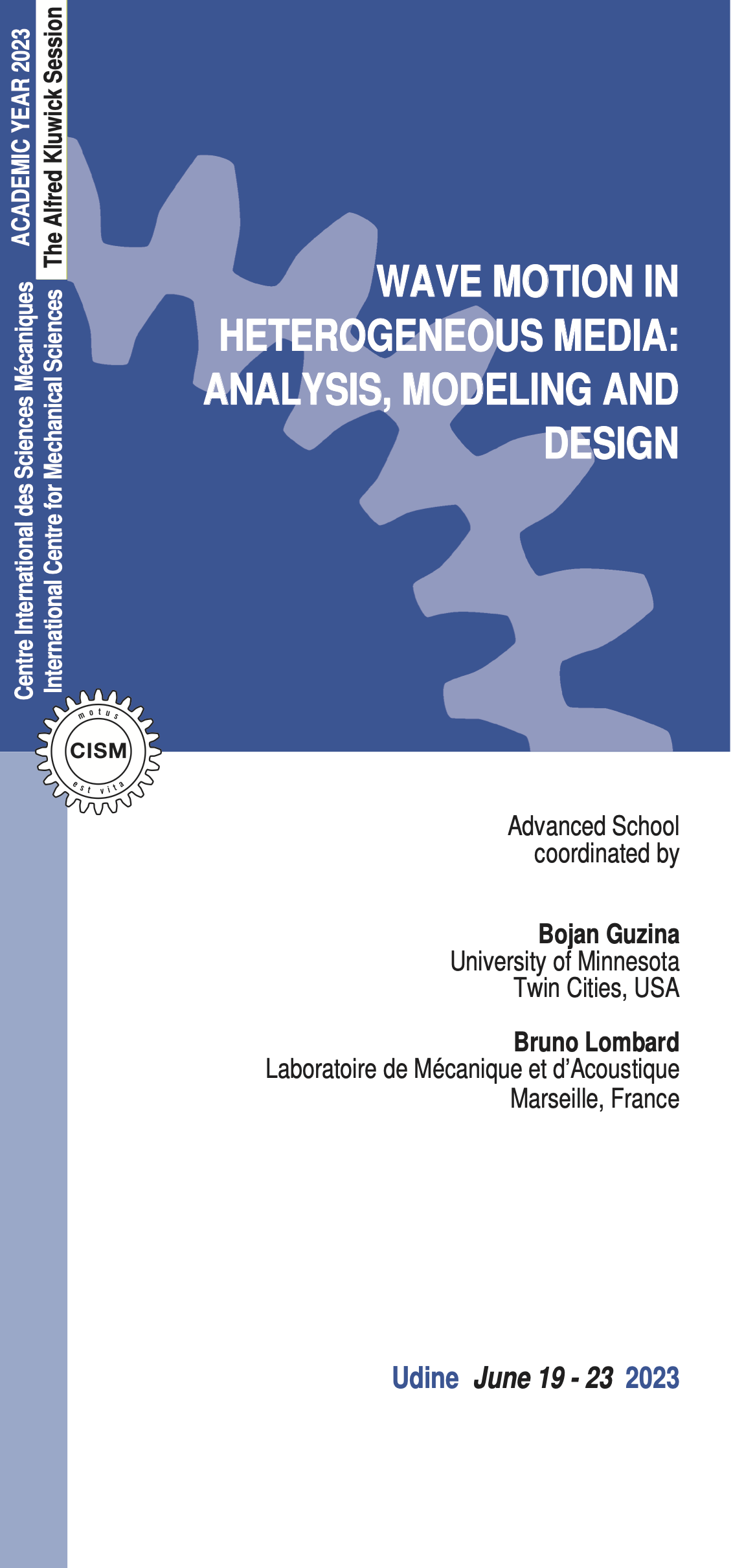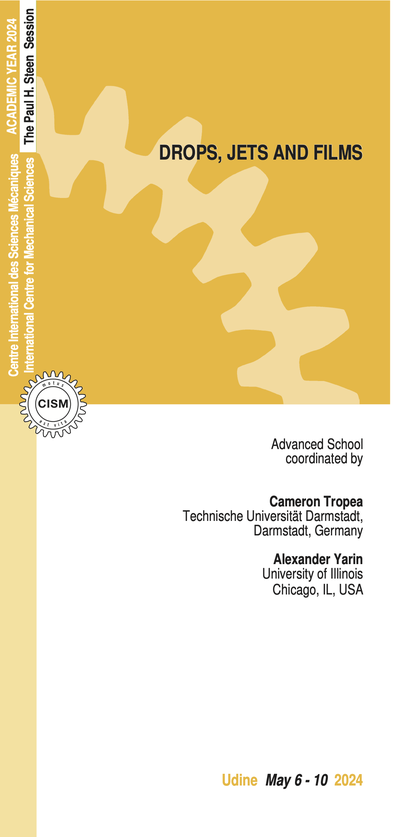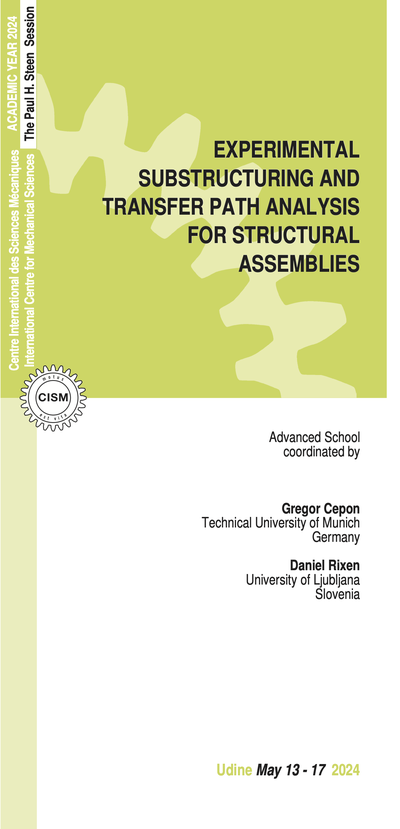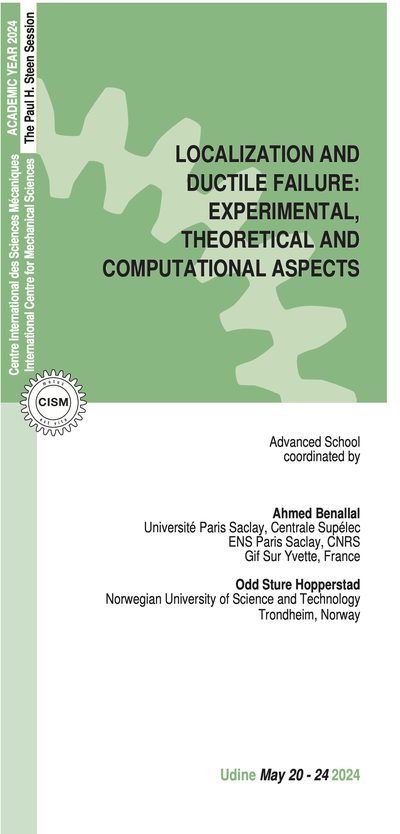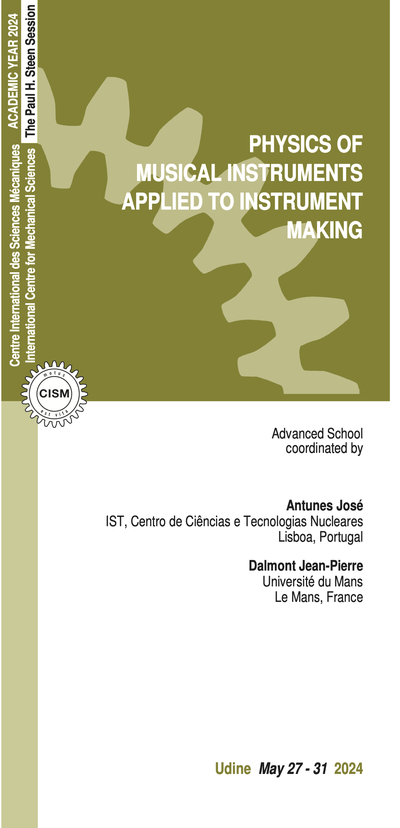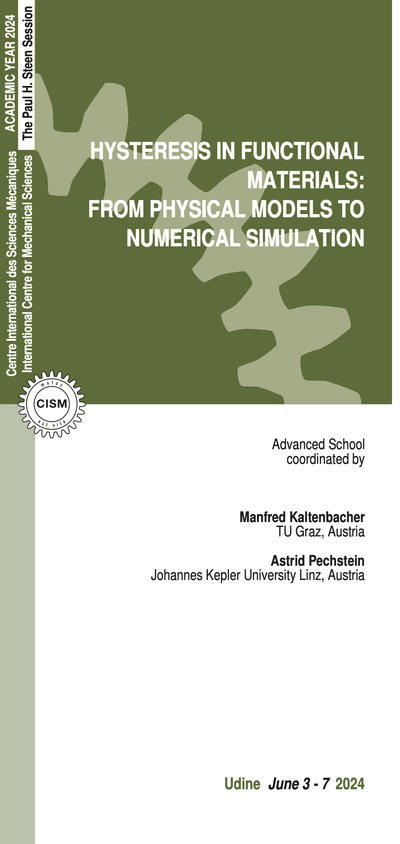A deep understanding of wave motion through heterogeneous solids and structures is critical to predict their dynamic behavior, or to tailor them for the purposes of e.g. cloaking, vibration control, seismic protection, information transport, and sub-wavelength sensing. In this vein, we aim to provide a review of recent developments on the subject by elucidating:
1. Wave propagation through periodic and non-periodic media and structures governed by either linear or non-linear field equations;
2. Homogenization of wave motion through “micro-structured” media; importance and utilization of the spectral singularities characterizing the dispersion map;
3. Boundary effects that are critical for understanding the dynamics of finite structures and phenomena such as topologically protected states;
4. Design and optimization of the heterogeneous (micro-) structure to achieve the sought wave phenomena.
The subjects will be covered from diverse viewpoints, including continuum mechanics, experimental mechanics, physics, and applied mathematics. The course will be structured as follows.
Introductory lectures will focus on the fundamentals of elastic wave motion in periodic media such as Bloch-Floquet theory, band-gaps, and spectral degeneracies. Essential mathematical tools will be recalled, including the (classical) low-frequency homogenization, high frequency homogenization, and Willis’ approach. Higher-order extensions of low-frequency homogenization will be introduced to facilitate topological optimization. Analogies will be drawn between the homogenization results and enriched continuum theories. Generalizations catering for the asymptotic treatment of aperiodic systems and arbitrary spectral neighborhoods will be included.The above fundamentals, introduced in the linear regime, will be partly extended to investigate the nonlinear dynamics of systems triggered e.g. by large deformations or multistable architectures. Effective description via non-local temporal operators will be included. Besides theoretical issues, experimental realizations will demonstrate the rich phenomenology of nonlinear metamaterials, including solitons and transition waves. Overall, it will be shown how a carefully designed architecture of engineering structures can be leveraged to control their dynamic performance.
Lastly the role of boundaries will be examined. The germane evanescent waves and underpinning eigenvalue problem will be highlighted. Boundary and interface correctors will be introduced to capture the effective transmission conditions. Recent developments on the asymmetric transport and topological insulators will be included. The robustness of interface states to disorder will be examined through the prism of topology. The analysis will focus on the class of partial differential Hamiltonians to which a topological charge can be assigned.
With this lecture series, we aim to attract doctoral students and researchers interested in the dynamics of micro-structured media and the design of next-generation of modern ("meta") materials. The objective is to provide the audience with a theoretical framework, computational tools, and experimental evidence to better understand the most recent developments on the subject and so facilitate the technology transfer from research to applications.
G. Bal, “Topological charge conservation for continuous insulators”, https://arxiv.org/abs/2106.08480.
R. Cornaggia and C. Bellis. “Tuning effective dynamical properties of periodic media by FFT-accelerated topological optimization”. Int. J. Num. Meth. Eng. 121 (2020), 3178-205.
R.V. Craster, J. Kaplunov, A.V. Pichugin, “High-Frequency homogenization for periodic media”, Proc. R. Soc. A, 466 (2010), 2341-62.
B.B. Guzina, S. Meng and O. Oudghiri-Idrissi, “A rational framework for dynamic homogenization at finite wavelengths and frequencies”, Proc. Roy. Soc. A, 475 (2019), 20180547.
L. Jin, R. Khajehtourian, J. Mueller, A. Rafsanjani, V. Tournat, K. Bertoldi, D.M. Kochmann, “Guided transition waves in multistable mechanical metamaterials”, Proc. Nat. Acad. Sci. 117, (2020), 2319-25.
S. Bourgeois, N. Favrie, B. Lombard, “Dynamics of a regularized and bistable Ericksen bar using an extended Lagrangian approach”, Int. J. Solids Struct. 207 (2020), 55-69. V. Laude, “Phononic Crystals: Artificial Crystals for Sonic, Acoustic, and Elastic Waves”, Berlin, Boston: De Gruyter, 2020.
6 lectures on: Asymmetric transport and topological insulators; Interface Hamiltonians; Invariance under large classes of perturbations; Bulk-boundary correspondence.
6 lectures on: Second-order dispersive homogenized models; Boundary and interface correctors; Topological optimization algorithm; Effective transmission conditions.
6 lectures on: Fundamentals about wave propagation in periodic media; Reminder of elastic continuum theory and thin-plate approximations; High frequency dynamic homogenization; Resonators and metamaterials.
6 lectures on: Pass and stop bands; Spectral homogenization and degeneracies; Homogenization of quasi-periodic media; Origami-type structural systems; Asymptotic evaluation of the Berry phase.
6 lectures on:Waves in periodic and spatially graded truss lattices; Multistable architectures; Tunable nonlinear wave motion; Phase transition phenomena in materials at small scales.
5 lectures on:Dispersive waves in linear and nonlinear media; Formalism of auxiliary fields; Dynamic homogenization of nonlinear cracks; Dynamics of a regularized Ericksen bar.
ADMISSION AND ACCOMMODATION
The course is offered in a hybrid format giving the possibility to attend the course also by remote (on Microsoft Teams platform). On-site places are limited and assigned on first come first served basis.
The registration fees are:
On-site participation, 600.00 Euro + VAT*
This fee includes a complimentary bag, five fixed menu buffet lunches, hot beverages, downloadable lecture notes.
Deadline for on-site application is May 19, 2023.
Online participation, 250.00 Euro + VAT*
This fee includes downloadable lecture notes.
Deadline for online application is June 7, 2023.
Application forms should be sent on-line through the following web site: http://www.cism.it
A message of confirmation will be sent to accepted participants.
Upon request a limited number of on-site participants can be accommodated at CISM Guest House at the price of 35 Euro per person/night (mail to: foresteria@cism.it).
* where applicable (bank charges are not included) Italian VAT is 22%.
CANCELLATION POLICY
Applicants may cancel their registration and receive a full refund by notifying CISM Secretariat in writing (by email) no later than:
- May 19, 2023 for on-site participants (no refund after the deadline);
- June 7, 2023 for online participants (no refund after the deadline).
Cancellation requests received before these deadlines will be charged a 50.00 Euro handling fee. Incorrect payments are subject to Euro 50,00 handling fee.
GRANTS
A limited number of participants from universities and research centres who are not supported by their own institutions can request the waiver of the registration fee and/or free lodging.
Requests should be sent to CISM Secretariat by April 19, 2023 along with the applicant's curriculum and a letter of recommendation by the head of the department or a supervisor confirming that the institute cannot provide funding. Preference will be given to applicants from countries that sponsor CISM.
